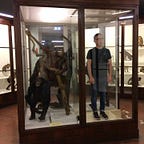My favourite writing about music
Aaron Gilbreath recently wrote about the state of longform music writing for Longreads, where he kindly tipped my Jesus Jellett story. Roxane Gay also recently asked on Twitter for recommendations of essays about music, which lead to dozens of great links. In that spirit, here are some of my current favourite pieces of longform music writing, both “classic” and more recent.
I’d love to hear what your favourites are.
Lillian Ross — Dancers in May: I love Lillian Ross. This story about a teacher and her class preparing for a May Day dance competition is beautiful, and a reminder that the best music writing doesn’t have to be about pop stars. You can read this in the New Yorker archives or in her collection Reporting Always.
John Jeremiah Sullivan — The Ballad of Geeshie and Elvie: I could have chosen any number of Sullivan stories (Michael Jackson, Bunny Wailer, the origins of the blues, Upon This Rock, Axl Rose, et al) but this is probably my favourite of his. Compelling story-telling, with a mystery at its heart.
James Baldwin — Journey To Atlanta: again, not necessarily a “music essay” but an essay about politics and race, focusing on Baldwin’s brothers’ gospel group and their trip to the American South. This was first published in the New Leader in 1948, and included in Notes of a Native Son.
Ellen Willis — Beginning To See The Light : Out of the Vinyl Deeps, Willis’ collection of music articles is wonderful, and this is probably my favourite piece, a genuinely thoughtful and thought-provoking consideration of punk.
Jules Siegel — Goodbye Surfing, Hello God! : I could read about The Beach Boys all day and this is the story that really created the Brian Wilson as a vulnerable genius persona. It sucks you in. It was first published in Cheetah in 1967, and has been republished by The Atavist.
Laura Snapes — How Robyn transformed pop: one of my favourite music stories this year. Such a deep, patient profile by one of the best music journalists around.
Margaret Whitehead — The Darfur Teenager Who Came Home a King : this story, of a Sudanese refugee and his boombox, has stayed with me since I first read it. Like so much of my favourite music writing, the music itself is a way of connecting you to a much bigger story.
Truman Capote — The Muses Are Heard : this wry 1956 story was first published in two parts in the New Yorker, and follows Capote’s journey to the USSR with the cast of Gershwin’s Porgy and Bess. You can read it in the New Yorker archives or in his collection, Portraits and Obaervations.
Hanif Abdurraqib — A Night In Bruce Springsteen’s America: a phrase from this story became the title for Abdurraqib’s collection They Can’t Kill Us Until They Kill Us. I love how he plays with classic rock crit tropes in this story — Springsteen in New Jersey, the death of Lennon — to open up other perspectives.
Lester Bangs — Astral Weeks : although much of Bangs’ writing frustrates me now, he was the first music writer I fell in love with — after falling in love with NME — and I am still something of a reluctant fan boy. This famous piece on Astral Weeks doesn’t have the fireworks of some of his earlier essays but it is more lasting for it.
Susan Orleans — Meet The Shaggs: another fascinating human story, where Orleans gets behind the “cult” classic LP by The Shaggs.
Steven Kurutz — Fruitland: its hard not to read this as a kind of companion to Orleans’ story, but this story about another “cult” LP — Donnie and Joe Emerson’s Dreamin’ Wild — is brilliant in its own right. It is available as a one-off hard copy or an electronic version via Creative Nonfiction.
Jenn Pelly — Punk’s Not Dead? How Vans Warped Tour Jumped The Shar: this was one of the most powerful pieces of criticism I read this year, both for its distinct lack of snideness about pop punk and for its clear-headed taking to task of the tour’s gender bias.
Skip Hollandsworth — O Sister, Where Art Thou?: one of the finest crime writers there is, unpicking the mystery of the female prisoners who became a country music sensation in the 1940s.
Jeff Maysh — The Counterfeit Queen of Soul: another of the finest crime writers there is, and another of my favourite music stories this year, on the woman who toured as Aretha Franklin.
